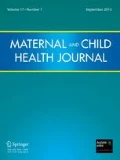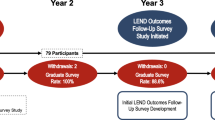Abstract
To describe the development and psychometric evaluation of the Core Competency Measure (CCM), an instrument designed to assess professional competencies as defined by the Maternal Child Health Bureau (MCHB) and targeted by Leadership Education in Neurodevelopmental and Related Disabilities (LEND) programs. The CCM is a 44-item self-report measure comprised of six subscales to assess clinical, interdisciplinary, family-centered/cultural, community, research, and advocacy/policy competencies. The CCM was developed in an iterative fashion through participatory action research, and then nine cohorts of LEND trainees (N = 144) from 14 different disciplines completed the CCM during the first week of the training program. A 6-factor confirmatory factor analysis model was fit to data from the 44 original items. After three items were removed, the model adequately fit the data (comparative fit indices = .93, root mean error of approximation = .06) with all factor loadings exceeding .55. The measure was determined to be quite reliable as adequate internal consistency and test–retest reliability were found for each subscale. The instrument’s construct validity was supported by expected differences in self-rated competencies among fellows representing various disciplines, and the convergent validity was supported by the pattern of inter-correlations between subscale scores. The CCM appears to be a reliable and valid measure of MCHB core competencies for our sample of LEND trainees. It provides an assessment of key training areas addressed by the LEND program. Although the measure was developed within only one LEND Program, with additional research it has the potential to serve as a standardized tool to evaluate the strengths and limitations of MCHB training, both within and between programs.
Similar content being viewed by others
Notes
Because the MCHB has provided a conceptual framework to support the core competencies measured by the CCM, we felt that a confirmatory factor analysis would be more appropriate to conduct than an exploratory factor analysis.
The anchor points were modified because the response category of ‘Strongly Disagree’ seemed to be a very unlikely choice that would be endorsed according to our stakeholder team.
Although the CCM was developed in the context of our LEND Program we had the opportunity to present our assessment tool to LEND directors at two national meetings, and although programs varied across the country, we received strong feedback that the measure likely would be quite applicable to most programs. Further, several programs have recently asked for copies of the measure to begin using and/or adapting slightly to meet the needs of their programs.
References
Maternal Child and Health Bureau Ad Hoc Strategic Planning Group. (2004). National plan for maternal and child health training 2005–2010: Goals, objectives and MCHB Activities. http://www.mchb.hrsa.gov/training/documents/pdf_library/MCH_Training_Strategic_Plan_9_15_04.pdf.
Maternal and Child Health Bureau. (2010). MCH training program: Leadership education in neurodevelopmental and related disabilities (LEND). http://mchb.hrsa.gov/training/documents/fs/lend_factsheet-rev1-14.pdf.
Maternal and Child Health Bureau. (2011). Conceptual framework. http://leadership.mchtraining.net/?page_id=157.
National Center for Cultural Competence. (2011). Self-assessments. http://nccc.georgetown.edu/resources/assessments.html.
Skytt, B., Carlsson, M., Ljunggren, B., & Engstrom, M. (2008). Psychometric testing of the Leadership and Management Inventory: A tool to measure the skills and abilities of first-line nurse managers. Journal of Nursing Management, 16(7), 784–794.
Weech-Maldonado, R., Dreachslin, J. L., Brown, J., Pradhan, R., Rubin, K. L., Schiller, C., et al. (2012). Cultural competency assessment tool for hospitals: Evaluating hospitals’ adherence to the culturally and linguistically appropriate services standards. Health Care Management Review, 37(1), 54–66.
Gozu, A., Beach, M. C., Price, E. G., Gary, T. L., Robinson, K., Palacio, A., et al. (2007). Self-administered instruments to measure cultural competence of health professionals: A systematic review. Teaching and Learning in Medicine, 19(2), 180–190.
Leff, S. S., Costigan, T. E., & Power, T. J. (2004). Using participatory-action research to develop a playground-based prevention program. Journal of School Psychology, 42(1), 3–21.
Nastasi, B. K., Varjas, K., Schensul, S. L., Silva, K. T., Schensul, J. J., & Ratnayake, P. (2000). The participatory intervention model: A framework for conceptualizing and promoting intervention acceptability. School Psychology Quarterly, 15(2), 207–232.
Hughes, J. N. (2003). Commentary: Participatory action research leads to sustainable school and community improvement. School Psychology Review, 32(1), 38–43.
Leff, S. S., Crick, N. R., Angelucci, J., Haye, K., Jawad, A. F., Grossman, M., et al. (2006). Social cognition in context: Validating a cartoon-based attributional measure for urban girls. Child Development, 77(5), 1351–1358.
Leff, S. S., Lefler, E. K., Khera, G. S., Paskewich, B., & Jawad, A. F. (2012). Preliminary examination of a cartoon-based hostile attribution bias measure for urban African American boys. American Journal of Community Psychology, 49(3–4), 332–346.
VanderVeen, J. W., Reddy, L. F., Veilleux, J. C., January, A. M., & DiLillo, D. (2012). Clinical PhD graduate student views of their scientist-practitioner training. Journal of Clinical Psychology, 68(9), 1048–1057.
Cicchetti, D. V., & Sparrow, S. A. (1981). Developing criteria for establishing interrater reliability of specific items: Applications to assessment of adaptive behavior. American Journal of Mental Deficiency, 86(2), 127–137.
Acknowledgments
The work was supported by a grant from the Health Resources and Services Administration, Maternal and Child Health Bureau (MCHB) # T73MC00051 to The Children’s Hospital of Philadelphia’s Leadership Education in Neurodevelopmental Disabilities (LEND) Program.
Conflict of interest
The authors had no conflicts of interest.
Author information
Authors and Affiliations
Corresponding author
Rights and permissions
About this article
Cite this article
Leff, S.S., Baum, K.T., Bevans, K.B. et al. Development, Validation, and Utility of an Instrument to Assess Core Competencies in the Leadership Education in Neurodevelopmental and Related Disabilities (LEND) Program. Matern Child Health J 19, 314–323 (2015). https://doi.org/10.1007/s10995-014-1514-z
Published:
Issue Date:
DOI: https://doi.org/10.1007/s10995-014-1514-z



